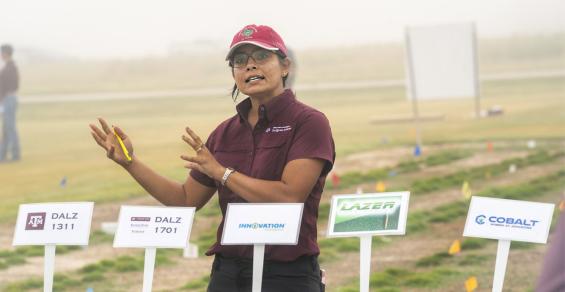New turfgrass varieties soon to be released or in the development pipeline that can withstand Texas’ harsh conditions were highlighted at the recent Texas A&M Turfgrass and Landscape Field Day in College Station.
The field day drew more than 250 participants, showcasing the latest research and fieldwork by Texas A&M AgriLife Research and the Texas A&M AgriLife Extension Service, which also included demonstrations and industry vendors.
Current issues
“A lot of issues that are part of this field day pertain to lawn, golf, sports field and the sod industries working collaboratively with our breeding program in Dallas,” said Ben Wherley, AgriLife Research turfgrass ecologist, College Station. “A lot of the projects that were discussed highlight that relationship, whether it be traffic tolerance from simulated athletic traffic, different cultivars of turfgrass or shade tolerance that affects homeowners, golf courses and sports fields.”
Some of the more basic applied aspects of turfgrass management included irrigation scheduling and sprayer calibration, Wherley said.
“We do a lot of this research in the field, which brings an opportunity to learn some new skills and stay abreast of the latest research that is going on,” he said. “The lawn care service folks are definitely interested in troublesome weeds and appropriate fungicides when dealing with difficult diseases.”
Wherley said irrigation management is always a big issue as well. As an industry, finding ways in management and through breeding systems to develop turf that requires less water and can survive more so on just rainfall is important.
Zoysiagrass traffic studies
Chrissie Segars, AgriLife Extension turfgrass specialist, Dallas, presented results from the Zoysiagrass Cultivar Traffic Tolerance study. Varieties tested included Tiftuf Bermuda, a popular option for homeowners that requires less water and can recover from drought more favorably than other Bermuda grass varieties.
Lazer is the newest golf greens variety of Zoysiagrass, while the Zeon variety held up well under light traffic. All of the varieties were put to the test with weekly traffic studies to indicate which would withstand different sports settings such as football, soccer and baseball. Traffic simulations were conducted using a Baldree traffic simulator to measure tolerance and recovery. Energy reduction tests were conducted to measure the impact of potential athlete head trauma and other injuries on the varieties.
A variety still in the testing phase, TAES-28, has shown favorable growth traits for Texas conditions, including heat tolerance.
AgriLife turfgrass breeding update
Ambika Chandra, AgriLife Research professor and turfgrass breeding program lead in Dallas, provided an update on work being done at the urban research center. She said the Texas A&M AgriLife center’s breeding program began in 1980 with an emphasis on new and improved varieties for homeowners and golf course putting greens.
One of those turfgrasses, Dalz 1701, a Zoysiagrass variety, is a collaborative effort between Texas A&M, Kansas State University and Purdue University. Its best trait is its extreme temperature tolerance, especially Texas heat, she said. This variety will be introduced soon.
More information about the turfgrass program is available at https://aggieturf.tamu.edu/.
The turf industry is researching ways through management and breeding systems to develop turf that requires less water.




